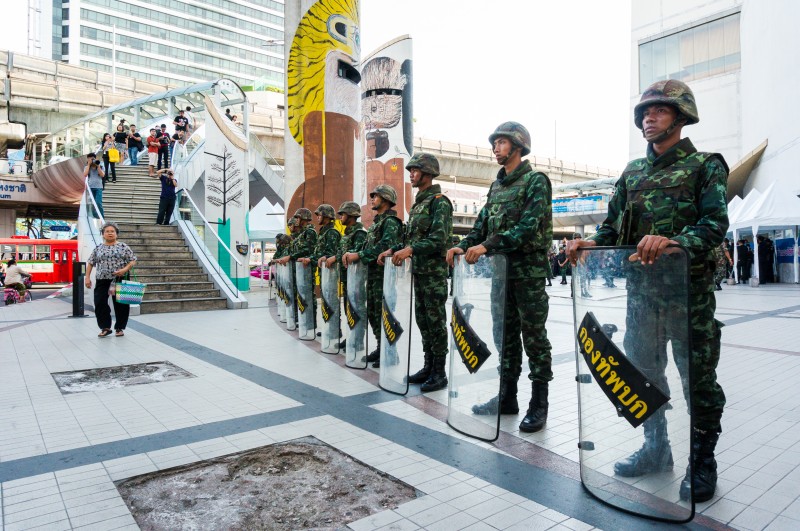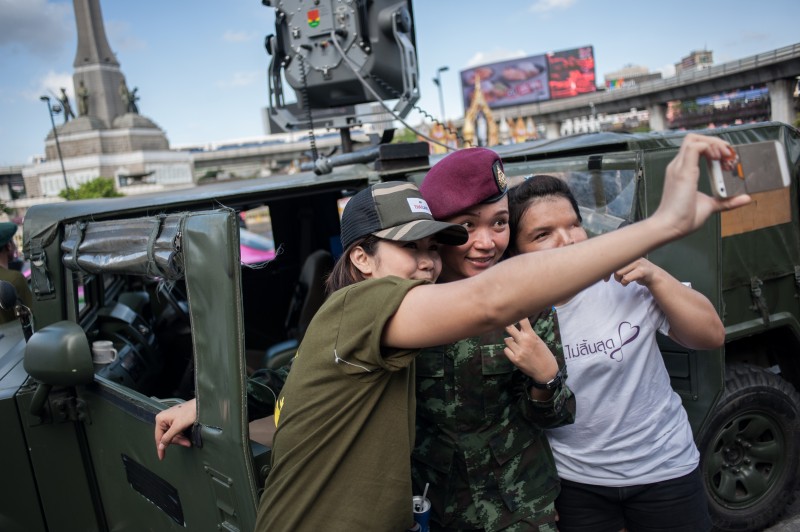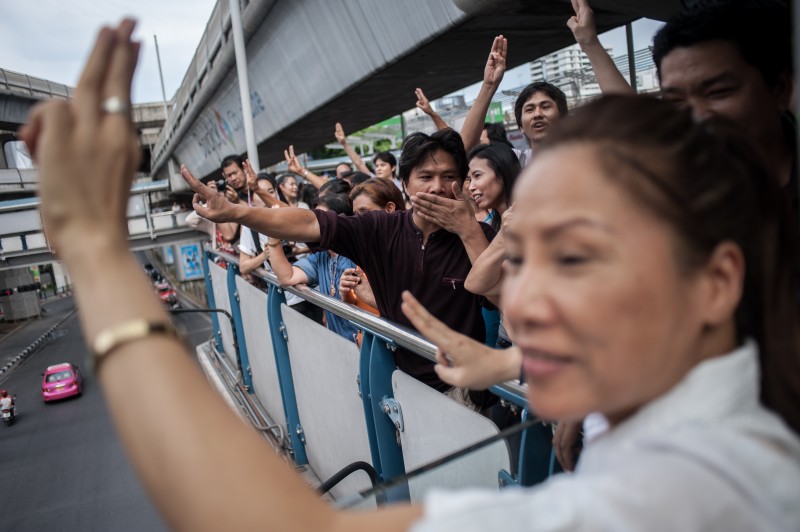
Soldiers standing guard outside of Bangkok Art and Culture Centre after the army launched a coup in May 2014. Photo by Hon Keong Soo, Copyright @Demotix (5/24/2014)
This year, Thailand survived violent street protests, an election boycott, a martial law regime, a so-called “happy” coup, media and web censorship, and the rise to power of a junta-backed government. Let us look back and review some of the Global Voices stories that featured the major political events in Thailand in the past 12 months:
January: Tens of thousands filled the major intersections of Bangkok as opposition groups intensified their bid to topple the government of then Prime Minister Yingluck Shinawatra. The protest led by former lawmaker Suthep Thaugsuban aimed to ‘shutdown’ Bangkok for several days or until Yingluck is removed from power.
February: Despite the anti-government rallies and the boycott campaign of the opposition, Thailand was able to conduct a ‘peaceful’ election. But many Thais were unable to vote or prevented from going near polling centers because of the protests. The number of disenfranchised voters was estimated at 12 million.
March: Thailand's Constitutional Court annulled the February elections by declaring it unconstitutional because voting failed to take place on the same day around the country.
April: Street protests continue to call for the removal of the caretaker government headed by Yingluck. She will eventually be forced to step down after the court ruled the following month that she abused her power in 2011 when she replaced the national security chief with one of her relatives.
May: Two days after declaring martial law and failing to mediate between rival political forces, the Royal Thai Army launched a coup on May 22, suspended the 2007 Constitution (except provisions on the monarchy), seized control of major media stations, and imposed a nighttime curfew. This was Thailand’s 12th coup; but more than 20 if we include the unsuccessful coup attempts in the past century.

Coup supporters take a selfie with a female soldier at Victory Monument in Bangkok. Photo by Yostorn Triyos, Copyright @Demotix (6/8/2014)
June: One of the early directives of the coup regime was the ban on the public gathering of five or more people. Although this didn’t stop anti-coup protesters from converging to various places, the army has become more intolerant of these protests by arresting those who defy this law. But protesters have found creative ways to express their opposition, like adopting the three-finger salute from the Hollywood film ‘Hunger Games’ to signify the people’s yearning for ‘liberty, equality, and fraternity.’
July: The Junta issued a new order banning media from reporting news that is critical of the government. Media groups immediately raised concern about the broad and vague provisions of the order. They also highlighted the severe punishment – legal prosecution, censorship, and shutdown – for violating any part of the order.
August: The National Council for Peace and Order, the name of the junta government, enacted an interim constitution as part of the purported roadmap of democratic reforms in the country. But critics have pointed out that the new charter is designed to perpetuate a military dictatorship. Using this constitution, General Prayuth Chan-ocha was selected by the National Legislative Assembly as Thailand’s 29th prime minister.
September: The deaths of British backpackers Hannah Witheridge and David Miller in Koh Tao island beach resort greatly embarrassed the military-backed government before the international community. The police was accused of bungling the investigation after failing to apprehend suspects and file appropriate charges in the court.

Anti-coup protesters show three-finger sign at Skywalk near Bangkok Art and Cultural Centre. Photo by Yostorn Triyos, Copyright @Demotix (6/1/2014)
October: For many months already, students have been ordered to memorize Prayuth’s ‘12 Core Values’ which focus on discipline and respect for authority. Some students have dared to protest this reform and other curriculum changes, which they said were done without consulting the public. Another reform dubbed as teaching ‘correct democracy’ was the revision of history books which allegedly already removed the name of former Prime Minister Thaksin Shinawatra.
November: Additional troubling signs of censorship: The media was asked by Prayuth not to report the activities of Thaksin and Yingluck, a TV host was replaced because the junta did not like her critical comments about the government, and the Hunger Games film was banned in some theaters and protesters were detained for doing the three-fingered salute.
December: Crown Prince Maha Vajiralongkron divorced his third wife, Princess Srirasmi, which sparked speculation about the royal succession and its impact on local politics.
It has been a very difficult 2014 for Thailand. Here’s hoping the new year will bring more meaningful and democratic reforms in the country.







32 comments